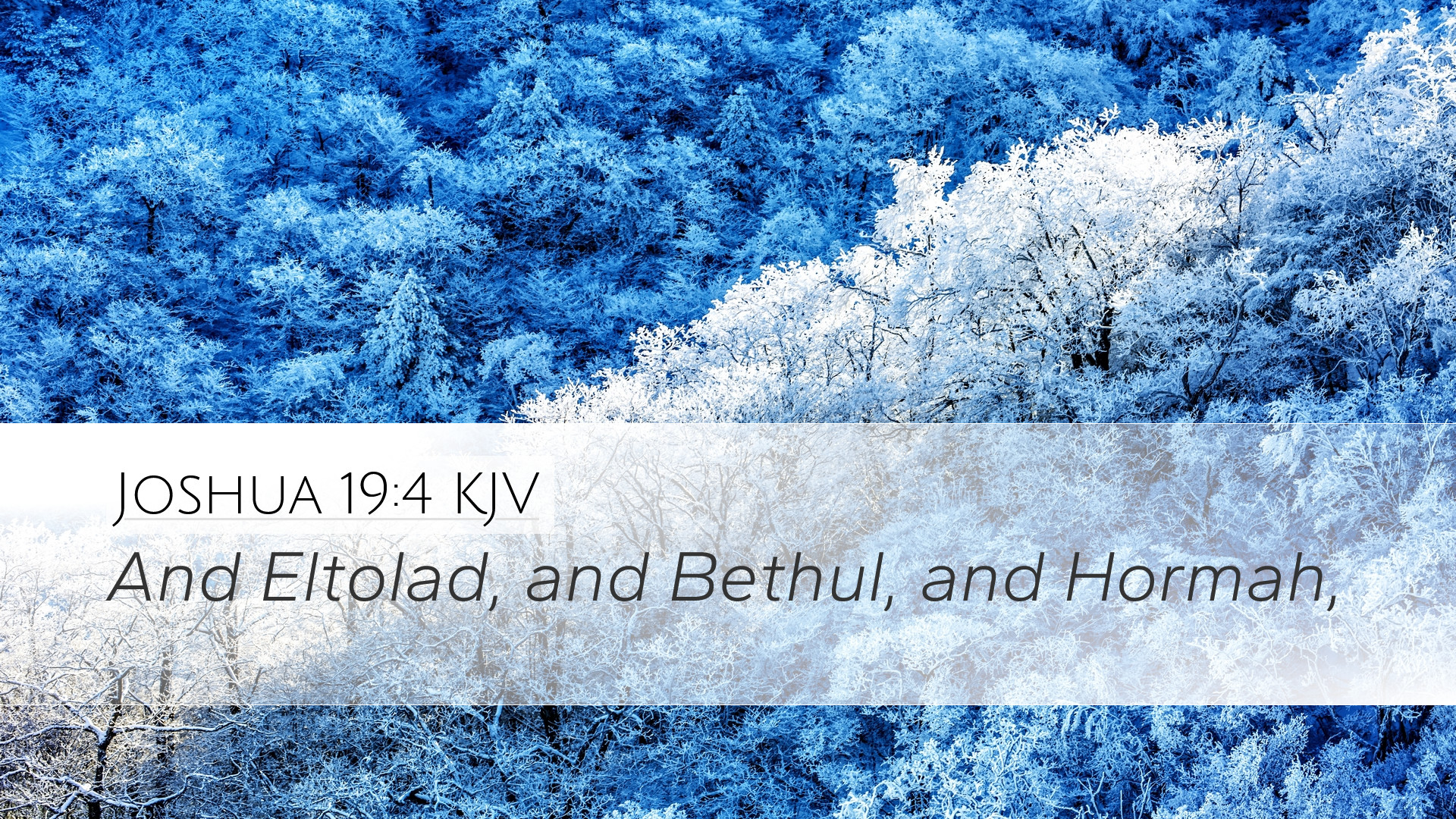Bible Commentary on Joshua 19:4
Joshua 19:4 states: "And Pilon, and the Ashteroth." This brief verse forms part of the allotment of the tribes of Israel, specifically detailing the inheritance of the tribe of Naphtali. Below, we summarize insights derived from various public domain commentaries, providing meaningful reflections for pastors, students, and theologians.
Contextual Overview
This passage occurs during the division of land among the tribes of Israel after their conquest of Canaan. The land was divided based on the population and needs of each tribe, as commanded by God through Moses and fulfilled under Joshua's leadership.
Insights from Public Domain Commentaries
Matthew Henry's Commentary
Matthew Henry emphasizes the importance of land allotment as a demonstration of God's faithfulness to His promises. He highlights the province of Naphtali, noting its fertile grounds and strategic location, rich in natural beauty, which serves as a metaphor for spiritual blessings:
- Land as Blessing: Henry draws parallels between the physical inheritance of land and the spiritual inheritance believers receive in Christ. Each tribe’s portion reflects God’s providence, and believers likewise partake in spiritual fortunes.
- Spiritual Applications: He makes a point about seeking God's guidance in decision-making, just as the Israelites sought God’s direction in dividing the land. This mirrors the necessity for believers to seek divine enlightenment in their own lives.
Albert Barnes' Notes on the Bible
Albert Barnes offers a detailed examination of the textual geography, noting that "Pilon" and "Ashteroth" were significant locations in Naphtali’s territory. His observations include:
- Historical Significance: Barnes links the cities mentioned to their historical significances, portraying them as centers of trade and culture, thus reflecting the tribe's identity and influence.
- Types and Shadows: He discusses how geographical locations in scripture often point toward greater spiritual truths. The cities may be seen as types representing safe havens for believers, reminding them of their ultimate refuge in Christ.
Adam Clarke's Commentary
Adam Clarke provides exegesis on the tribes and their distribution, laying emphasis on the specific characteristics of Naphtali’s inheritance:
- Symbolism in Names: Clarke delves into the meaning of the tribe names and their significance in terms of the tribe's history and calling. He notes how “Naphtali” evokes themes of struggle and victory, which resonate with the enduring faith of believers facing trials.
- Prophetic Implications: Clarke points out the prophetic undertones woven into the allotment, suggesting that the land division also foreshadows the coming and establishing of Christ’s kingdom, wherein believers will find their ultimate inheritance.
Theological Implications
This passage urges reflection on the themes of inheritance and faithfulness. The Israelites’ possession of the promised land serves as a tangible testament to God’s commitment to His covenant. The reflections from the commentaries help to draw a number of theological implications:
- God’s Covenant Faithfulness: Just as God fulfilled His promise to Israel, believers today can trust in His promises regarding their own spiritual inheritance.
- Significance of Every Tribe: Each tribe’s allocation signifies the diversity within the body of Christ, highlighting that every believer has unique contributions to the whole, regardless of their background or situation.
- Land as Metaphor for Spiritual Growth: The land represents a place for growth and development, encouraging believers to cultivate their relationship with God and flourish in their faith journey.
Practical Applications
For pastors, students, and scholars, understanding this passage can inspire a deeper engagement with the themes of inheritance and communal identity in Christ:
- Encouragement for Discipleship: Encourage individuals to seek God’s direction in their personal and communal lives, just as the Israelites did in their territory allocation.
- Fostering Unity: Recognize and celebrate diversity within church congregations, viewing it as a reflection of God's expansive grace and plan for mankind.
- Empowerment through Knowledge: Use insights from these passages to inform teaching and preaching, instilling a greater understanding of God’s overarching narrative and commitment to His people.
Conclusion
In Joshua 19:4, we glean profound insights into the nature of God’s promises and the fulfillment thereof. The observations and reflections drawn from the commentaries of Matthew Henry, Albert Barnes, and Adam Clarke not only enrich our understanding of Israel's inheritance but also illuminate the broader spiritual truths applicable to believers today. The message encourages ongoing exploration of scripture and a commitment to live out our inheritance in faithfulness as part of God's continued story.


